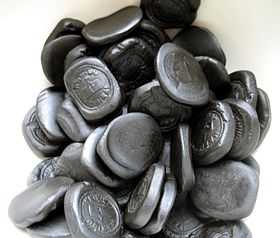Pontefract cake
| Pontefract cake | |
|---|---|
|
A pile of Pomfret cakes | |
| Alternative names | Pomfret cake, Pomfrey cake |
| Type | Confectionery |
| Place of origin | England |
| Region or state | Yorkshire |
| Main ingredients | Liquorice |
|
| |
Pontefract cakes (also known as Pomfret cakes and Pomfrey cakes) are a type of small, roughly circular black sweet measuring approximately 2 cm in diameter and 4 mm thick, made of liquorice, originally manufactured in the Yorkshire town of Pontefract, England.
Name
The original name for these small tablets of liquorice is a "Pomfret" cake, after the old Norman name for Pontefract. However, that name has fallen into disuse and they are now almost invariably labelled "Pontefract cakes". The term "cake" has a long history. The word itself is of Viking origin, from the Old Norse word "kaka".[1][2]
Production and design
Originally, the sweets were embossed by hand with a stamp, to form their traditional look (the workers who did this were known as 'cakers' and were able to produce upwards of 30,000 per day), but now they are usually machinery formed. The embossed stamp was originally a stylised image of Pontefract Castle with a raven on the top bar, which is thought to have been in use for almost 400 years.[3] When the first secret ballot in the United Kingdom was held in Pontefract on 15 August 1872, the ballot box used was sealed using a Pontefract cake stamp from Frank Dunhill’s factory, which shows the image of a castle and an owl.[4]
Health warning
Healthcare professionals have warned against overindulgence in liquorice after a 56-year-old woman was admitted to hospital following an overdose. The woman consumed about 200g daily leading to dangerously low potassium levels and subsequent muscle failure. The European Commission recommends limiting consumption of the active ingredient, glycyrrhizic acid, to 100 mg or less per day.[5]
References
- ↑ The history of cakes. Devlaming.co.za. Retrieved on 2011-12-23.
- ↑ http://www.surnameweb.org/Cake/surname-origin.htm
- ↑ Lorenzo Padgett (1905). Chronicles of Old Pontefract. Old Hall Press, Leeds. p. 203. ISBN 1152214659.
- ↑ "Pontefract's secret ballot box, 1872". Wakefield Council. Retrieved 2013-03-24.
- ↑ "Woman 'overdoses' on liquorice". BBC News Online. BBC. 21 May 2004. Retrieved 2008-06-07.
| ||||||||||
